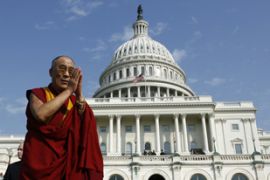Dalai Lama receives US honour
US congress bestows highest civilian award despite Chinese protests.

The Dalai Lama said: “The consistency of US support for Tibet has not gone unnoticed in China, where this has caused some tension in US-China relations. I feel a sense of regret.”
“Today, I wish to share with you all my sincere hope that the future of Tibet and China will move beyond mistrust on a relationship based on mutual respect and recognition of common interests.”
Meanwhile, Bush said that he had explained to Hu Jintao, the Chinese president and the leadership in Beijing, why he attended the ceremony.
He said: “They didn’t like it, of course. But I don’t think it’s going to damage, severely damage, relations.”
“I have consistently told the Chinese that religious freedom is in their nation’s interest. I’ve also told them that it’s in their interest to meet with the Dalai Lama and will say so at the ceremony.”
China pulled out of a meeting this week where world powers were to discuss Iran, in apparent protest at congress’s plan to honour the Dalai Lama with its highest civilian award.
China had also cancelled an annual human-rights dialogue with Germany to show displeasure over Chancellor Angela Merkel’s September meeting with the Dalai Lama.
Diplomatic balancing
Bush wants to ease anger in China, a growing economic and military power that the United States needs to manage nuclear standoffs with Iran and North Korea.
He also wants to be seen as a champion of religious freedom and human rights.
The Dalai Lama, for his part, seemed unconcerned about China’s reaction to his half-hour meeting with Bush on Tuesday.
“That always happens,” he said with a laugh, speaking to reporters gathered outside his hotel.
Chinese anger
Tibet has been ruled by China since Communist troops invaded the country in 1950, and the government is said to deal harshly with Tibetans who press for greater political and religious freedom.
Ye Xiaowen, director-general of the state administration for religious affairs, said: “The protagonist of this farce is the Dalai Lama.”
The Dalai Lama has lived in exile in India since fleeing his predominantly Buddhist homeland in 1959 after a failed uprising against communist rule.
He supports a “middle way” approach that advocates autonomy for Tibet within China and greater freedom to practice the region’s form of Buddhism.
But Chinese officials do not trust him and have accused him of being a separatist.
Beijing’s rhetoric against the Dalai Lama has been increasing, even though the Chinese government is engaged in dialogue with his envoys.